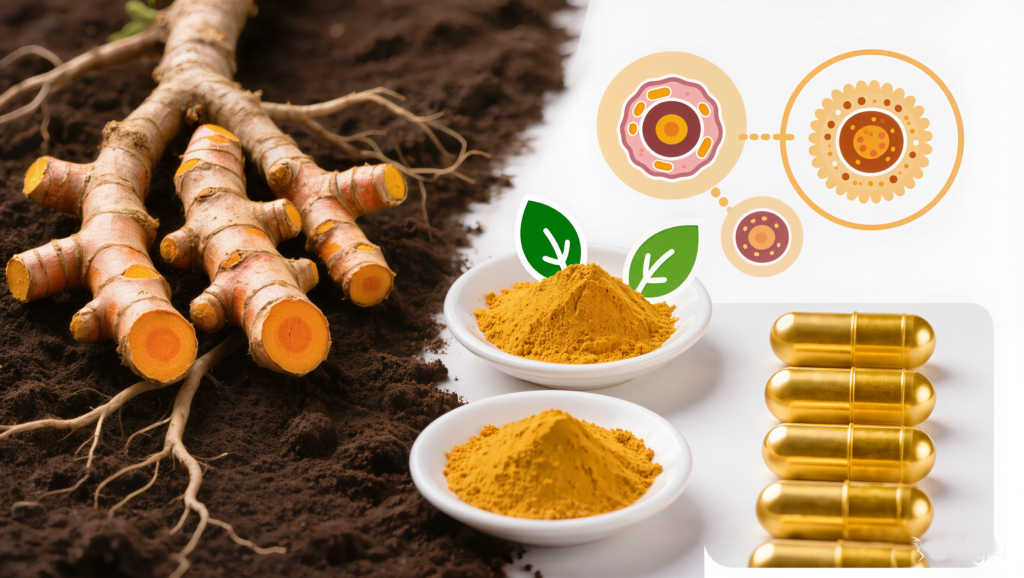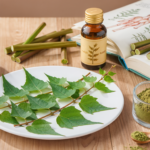近年、ウコンとクルクミンはともに健康食品として急速に注目を集め、関節の快適性、可動性の向上、慢性的な痛みの軽減といった効果が謳われています。しかし、買い物客は「ウコン」パウダーや「クルクミン」カプセルといった様々な商品に圧倒され、どちらの形態が最も抗炎症効果が高いのか、あるいはどちらが本当に優れているのか、必ずしも明確ではありません。そこで、科学、伝統、吸収率、そして臨床結果を掘り下げて、重要な疑問に答えてみましょう。ウコンとクルクミン、どちらが炎症を抑えるのに最適でしょうか?
ウコンとクルクミン:基本情報
ウコン:黄金の根
ウコン(Curcuma longa)は、4000年の歴史を持つスパイスであり、薬効のある根菜です。世界中で食用やアーユルヴェーダ医学に用いられています。乾燥粉末には、クルクミノイドと呼ばれる化合物群が含まれています。その中で最も研究されているのはクルクミンで、ウコンの重量の約2~8%を占めています。ウコンには、精油、ターメロン、多糖類、タンパク質、ミネラルなど、健康に寄与する様々な化合物も含まれています。
クルクミン:強力な分子
クルクミンは、ウコンから単離された濃縮された活性「スター」化合物です。強力な抗炎症作用と抗酸化作用を持つことから、数十年にわたり精査され、数百件の研究で検証され、関節炎、腸疾患、がんなどの治療薬候補として数千件もの引用文献が挙げられています。
炎症に実際にどのように作用するのか?
ウコンとクルクミンはどちらも炎症を抑制しますが、そのメカニズムはわずかに異なります。
クルクミン:
NF-κB、MAPK、JAK/STAT経路を含む炎症シグナル伝達を分子レベルで阻害します。
炎症性サイトカイン(IL-1β、IL-6、IL-8、TNF-α)や、COX-2、iNOSなどの酵素を抑制します。
免疫バランスを調整し、自己免疫や慢性炎症に重要なTh17/Treg細胞の適切な比率を回復させます。
ウコン根:
クルクミンは主な抗炎症剤として作用しますが、他の化合物(ターメロン、多糖類、オイル)も免疫反応を調整し、酸化ストレスを軽減します。
伝統医学に基づき、より広範な植物分子と連携してホリスティックに作用します。
臨床研究:ウコン vs. クルクミン
クルクミン:ヒト試験において強力な抗炎症作用を示し、NSAIDsに匹敵する効果がありながら、副作用はありません。
数千人の患者を対象としたメタアナリシスでは、クルクミンの補給がC反応性タンパク質(CRP、主要な炎症マーカー)と炎症性サイトカインを減少させ、関節炎、大腸炎、さらには運動後の痛みなどの症状を改善することが明らかになっています。
ウコン:複数の研究で、ウコン抽出物(根のすべての化合物を含む)が関節炎、炎症性腸疾患、関節痛に効果があることが示されており、症状緩和においてNSAIDsに匹敵することもあります。
ウコンの幅広い植物化学物質プロファイルは、慢性疾患に対するより穏やかで持続的なサポートを提供し、抗酸化保護効果を高める可能性があります。
バイオアベイラビリティの問題:単離クルクミン vs. ホールウコン
両者の最も重要な違いの一つはバイオアベイラビリティ、つまり実際に体内で吸収され、利用されるクルクミンはごくわずかです。
クルクミンの課題:純粋なクルクミンは単体では吸収率が低く、大部分はすぐに代謝されて排出されます。吸収を高めるために、製品には以下のような工夫が凝らされています。
黒コショウ抽出物(ピペリン):クルクミンの吸収を最大2,000%向上させます。
油脂:クルクミンは脂溶性であるため、油脂と一緒に摂取するとバイオアベイラビリティが向上します。
特別な配合:リポソーム、ナノ、ミセルといった形態は、安定性と吸収性を高め、より多くの活性クルクミンを組織に届けます。
ウコンの利点:天然のウコンパウダーには油脂が含まれており、吸収をある程度促進する可能性があります。伝統的なレシピでは、ターメリックを油やコショウと組み合わせることがよくありますが、これには理由があります。
サプリメントの選び方:ほとんどの臨床試験では、標準化されたターメリック抽出物(クルクミノイドを含む)または高用量のクルクミン配合が使用されていますが、日常的に食品に摂取するターメリックは、より低い濃度ながらも定期的に摂取できます。
どちらを選ぶべき?
ターメリック:全身への優しいサポートに最適
健康全般を求めている方、抗炎症スパイスを使った料理をしたい方、または腸が敏感な方には、ターメリックパウダーが最適です。
抗酸化物質、オイル、ターメロンなど、様々な化合物が相乗効果を発揮します。
優しく安全で、食べ物や飲み物に簡単に混ぜることができます。
毎日の長期的なサポートに最適です。
クルクミン:集中的な強力な緩和に最適
以下の症状がある場合:
重度の関節痛または筋肉痛
炎症性疾患または自己免疫疾患と診断された場合
または、特定の理由で高用量の介入が必要な場合
クルクミンサプリメント(ピペリンや特殊な脂肪などのバイオアベイラビリティ向上剤を含む)は、強力で均一な抗炎症効果をもたらす可能性が高くなります。
多くの場合、両方を組み合わせることで効果的です。ターメリックを定期的に料理に使い、急性または慢性の症状に応じて高品質のクルクミンサプリメントを併用してください。
安全性と副作用
ターメリック:忍容性が高く、料理や適度なサプリメント(1~4g/日)で安全に摂取できます。
クルクミン:ほとんどの研究では1日2gまで安全ですが、胃腸障害、頭痛、または血液凝固阻止剤との相互作用を引き起こす可能性があります。用量については、特に他の薬を服用している場合や持病がある場合は、必ず医療提供者にご相談ください。
吸収促進剤:クルクミンまたはターメリックを黒コショウや健康的な脂肪(オリーブオイル、ココナッツミルク)と組み合わせると、効果を高めることができます。
最良の結果を得るための簡単なヒント
クルクミノイド含有量が95%に標準化され、ピペリンなどの吸収促進剤が配合されているか、ミセル/ナノ処方のクルクミンサプリメントを選びましょう。
脂溶性の吸収を高めるため、ターメリックとクルクミンは食事と一緒に摂取しましょう。
ターメリックパウダーは料理にたっぷり使い、相乗効果を得るために生姜、黒コショウ、その他の抗炎症食品と組み合わせることを検討してください。
治療目的で高用量を使用する場合は、症状を観察し、医療専門家にご相談ください。
最終的な結論
クルクミンは強力で、標的を絞った抗炎症作用を有します。臨床的に「強力な効果」を持つと考えてください。しかし、多くの人にとって、ウコンの根を丸ごと摂取するという伝統的な知恵は、植物性化合物のポートフォリオと共に、慢性炎症と健康全般をより穏やかに、そして長期的にサポートします。理想的には、キッチンとサプリメント棚に両方を置くスペースがあれば、ウコンの幅広いスペクトラムとクルクミンの集中的な効果の恩恵を受けることができます。
この記事はいかがでしたか?Youtube, Instagram, Facebook, Pinterest, Twitter (X) でフォローして、ナチュラルヘルスと持続可能なウェルネスに関するその他のコンテンツをご覧ください。








